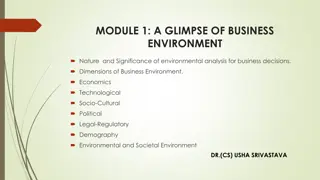
Understanding Political Factors in the Business Environment
Explore the impact of political factors on businesses, including government support, taxation, infrastructure, and more. Learn how political stability, party manifestos, and government initiatives influence business decisions and operations.
Download Presentation

Please find below an Image/Link to download the presentation.
The content on the website is provided AS IS for your information and personal use only. It may not be sold, licensed, or shared on other websites without obtaining consent from the author. If you encounter any issues during the download, it is possible that the publisher has removed the file from their server.
You are allowed to download the files provided on this website for personal or commercial use, subject to the condition that they are used lawfully. All files are the property of their respective owners.
The content on the website is provided AS IS for your information and personal use only. It may not be sold, licensed, or shared on other websites without obtaining consent from the author.
E N D
Presentation Transcript
Unit BM301: An introduction to the Business Environment
Learning outcome 4 Identify legal, political, and social factors that can affect businesses
Activity What are political factors
Political factors involve the decisions and laws that governments makes. These include: Tax Laws Political stability Political factors
Political factors Political stability Government support Taxation Infrastructure Enhancing skills Membership of international trading communities
Political stability Political party elected & draw up manifesto (plan) which is made public Businesses use manifesto to identify changes that might affect them Example: Rises in environmental taxes, especially on larger cars resulted in businesses in car industry producing more smaller, fuel- efficient and energy efficient cars
Government support Private sector government tries to create competitive environment Voluntary sector -government provides: Cash grants, e.g. National Lottery Commission, for activities that benefit wider community Tax relief on premises owned by organisation Public Sector government: Covers losses made by organisations Subsidise non-profit making activities, e.g. maintaining roads, funding of welfare, education & health services
Government Support Direct support: Grants and loans Given as business activity supports government policy Example grants given to employers training young & previously unemployed workers Organisations to support businesses: Example: Business Link A free service providing businesses with information To help businesses be more efficient
Taxation Helps government raise revenue Helps discourage some activities and encourage others Example: High taxes on Cigarettes Fuel Businesses see taxes as a cost that eats into profit Tax rates are changed in the annual budget Taxes affecting businesses Corporation Tax, Income Tax, National Insurance, VAT, Customs Duty
Providing infrastructure Government provides central infrastructure of the economy: Builds & maintains motorways & major transport links Maintains railway lines & stations Paid for Internet facilities to be installed in libraries and other public locations
Enhancing skills of the population Education and training: Educational framework types of qualifications Training courses industry training schemes, e.g. construction, motor vehicle, etc Research labour market to identify future growth in particular industries to target education & training effectively
Membership of international trading communities Important to create international links UK is important member of EU Benefits include free movement of: Goods Capital Labour
Activity What Are Legal Factors?
What Are Legal Factors? Legal factors are external factors which refer to how the law affects the way businesses operate and customers behave. Product transportation, profit margins, and viability of certain markets are all examples of things which may be influenced by legal factors.
Legal Factors Company law Governs how businesses are set up and run Contract law Consumer protection Employment law Competition law Governs how businesses are allowed to compete with each other
Rules regarding: Who can set up a business Company Law Steps and paperwork involved Reports and accounts of a business Business names
Businesses form contracts with different individuals, groups and bodies: Consumers consumer protection law Employees contract of employment; employment directives Contract Law Lenders Sellers of land and buildings Suppliers of equipment Suppliers of stock
Competition Law Governs how businesses can compete with each other to ensure fair and honest trading Laws against restrictive business practices to reduce competition, e.g. 2 or more sellers agreeing to set prices Monopoly and merger legislation to stop businesses from dominating a particular market Laws against Resale Price Maintenance, stopping a manufacturer from controlling the price at which a retailer can sell their goods
Activity What are social factors?
Social factors Social factors are things that affect habits and spending of customers. Demographic Lifestyles Tastes and trends This includes:
Social Factors Over time changes in society can affect businesses: Demographic issues Changes in structure Household & families Education Attitude to work Religions Attitudes to male & female roles Ethics
Demographic issues When population grows, is increase in: Demand for goods & services No. of people available for work First decade of 21st Century saw rapid increase in UK population. Reasons include: Boom in economy Large no. of (some highly skilled) workers from EU states Young people & learners from overseas = ready pool of labour
Changes in structure No. of older people in Britain is increasing fast No. of people over 60 could rise by 40% in the next 30 years People work and save when young & live off the proceeds when they retire Aging population have different spending patterns to the young New businesses will open to cater for their needs, especially e-commerce
Household and families Change in UK population due to rise of single- person households Average age of marriage is increasing & many people live alone Many single people are high-income earners with high disposable incomes
Education Many modern jobs require good educational qualifications Employees expected to have good IT, maths & English skills Vocational qualifications good preparation for supervisory & management posts at work Previous government set target for 50% of population to attend university Businesses support government initiatives and can suggest skills required for future employees
Attitude at work Refers to: Hours of work Care taken by employees in completion of work Employees attitudes to customers Employees relationship with employers
Attitudes to males and females roles Male & female roles in society have been shifting over the last 50 years Today 50% of working population is female and over half of new entrants to careers in medicine, the law and similar professions are female Changing gender roles has impacted on consumption patterns, e.g. rapid rise on ready meals market is partly a response to families where both parents work and there are growing numbers of cash rich, time poor individuals
Ethnics Business ethics are the values & principles held by those running businesses. Ethics help shape the actions & decisions of a business Key ethical issues: Fair trade Environment Not misleading customers Providing useful goods & services Corporate Social Responsibility (CSR) modern businesses develop policies and carry out actions that are responsible






















